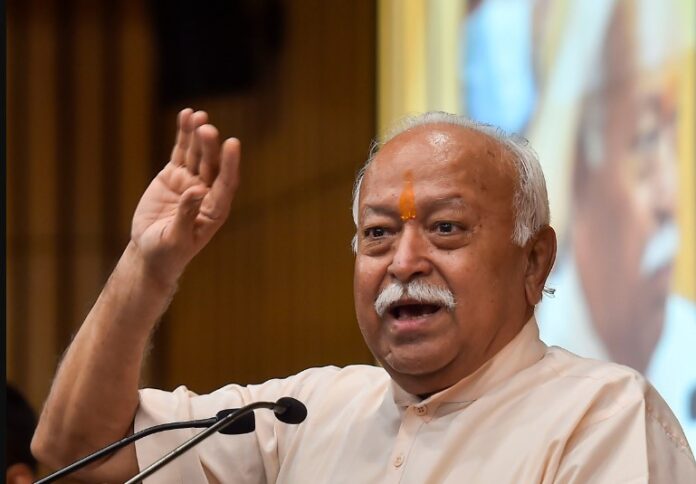The RSS chief Mohan Bhagwat hinted at these in a speech on Monday.
By P.K.Balachandran
Colombo, June 11: The just-concluded 2024 parliamentary elections had clearly brought out the growing rift between the Bharatiya Janata Party (BJP) and its parent organization and ideological forebear, the Rashtriya Swayamsewak Sangh (RSS).
The RSS-BJP cleavage appears to be both political and ideological. RSS chief Mohan Bhagwat hinted at the twin cleavages in a speech in Nagpur on Monday, without naming the BJP or its supremo, Narendra Modi.
As the BJP launched its election campaign for the 18 th. Lok Sabha, few failed to notice that RSS cadres were conspicuously absent from the electoral arena.
The explanation generally offered was that the RSS disapproved of the personality cult that the BJP had built around Prime Minister Narendra Modi. Personality cult is anathema for the RSS, which believes in the subordination of the individual to the organization.
BJP President J.P.Nadda’s brazen proclamation of May 18 that the BJP had grown out of the confines of the RSS only added to the parent body’s alienation from its political arm.
But it is now clear that the differences are not just about power, but about ideology. This came out on June 10 in a speech given by the RSS chief Mohan Bhagwat in Nagpur, where the headquarters are located.
Addressing a gathering of RSS trainees at the concluding programme of the organisation’s Karyakarta Vikas Varg- Dwitiya at the Dr Hedgewar Smriti Bhavan, Bhagwat began by appealing to its cadres to end election rhetoric and instead focus on problems facing the nation. His argument was that since the results had come and a government had been formed, it would be futile to debate on what and how things happened.
With this, Bhagwat seemed to quash rumours that an unhappy RSS would try to topple Modi and put its own loyalist in power as PM.
The need of the hour, Bhagwat stressed, would be to ponder over and act on the fundamental issues facing the country such as social conflicts, social harmony, disregard of the environment, dangers from climate change and the role of history in shaping current attitudes towards communities.
Mutual Acceptance
Bhagwat spoke at length about the need for social harmony, a kind of harmony based on mutual acceptance, irrespective of past conflicts.
This was a reference albeit oblique, to the Hindu-Muslim conflict which Modi persistently tried to foment in this election speeches.
Bhagwat acknowledged that such conflicts were due to the doings of people who came from outside India, but the present could not be held to ransom by past events, he argued. It was time, people of today brushed aside the past, accepted each other, and lived in harmony, the RSS chief said.
He stressed the need for unity among all communities in the country, which he noted was diverse. Acceptance of diversity of religions, cultures, places of origin, would be critical to make India a united country, Bhagwat said.
Bhagwat exhorted political leaders to be mindful of the fact that their utterances might cause rifts among communities. He lamented that even the RSS was being dragged into these controversies without any reason.
“Indian society is diverse but everyone knows it is one society and they also accept its diversity. Everyone should walk together respecting each other’s way of worship,” he said.
He called for the recognition of the “goodness and humanity” in religions like Islam and Christianity and said that adherents of all faiths must respect each other as brothers and sisters.
Everyone must go ahead believing that this nation is ours and that all those who are born on this land are our own, Bhagwat added.
Some Caveats
Bhagwat mentioned some caveats relating to Hindus and Muslims.
He said that the thinking by some that only foreign ideologies are true must be done away with.
Calling for social reform in all communities, Bhagwat said that casteism must be thrown out completely from Hindu society. He also said that the custom of polygamy must be rooted out in an apparent reference to Muslims.
He urged RSS workers to work for social harmony.
Special Mention of Manipur
If Bhagwat spoke about any part of India, it was about the horrendous violence in Manipur.
It is significant that Manipur is a place which Prime Minister Modi had failed to visit during or after the violence.
“Manipur is waiting for peace for the last one year. There was peace in Manipur 10 years ago. It felt like gun culture had finished there. But the state has suddenly seen violence,” Bhagwat said.
“The situation in Manipur will have to be considered with priority. Manipur is burning and people are facing its extreme heat,” the RSS chief said.
Fresh violence has been reported from Jiribam over the past few days.
END





